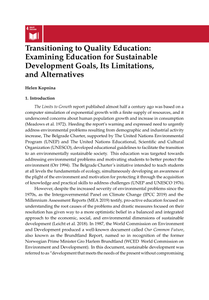The Kunming-Montreal Global Biodiversity Framework, launched during the United Nations Biodiversity Conference in December 2022, encourages governments, companies and investors to publish data on their nature-related risks, dependencies and impacts. These disclosures are intended to drive businesses to recognise, manage and mitigate their reliance on ecosystem goods and services. However, there is a ‘biodiversity blind spot’ that is evident for most organisations and business schools. Business education rarely addresses the root causes of biodiversity loss, such as the unsustainable exploitation of natural resources. As the dominant positioning of Education for Sustainable Development Goals (ESDG) presents biodiversity in anthropocentric instrumental terms inadequate for addressing ecosystem decline, we posit that a more progressive and transformative ecocentric education through ecopedagogy and ecoliteracy is needed. Both approaches include the development of critical thinking about degrowth, the circular economy and conventional stakeholder theory to include non-human stakeholders. Using comparative case studies from Northumbria University, the University of Hong Kong and Amsterdam University of Applied Sciences, we illustrate how business education can be transformed to address biodiversity loss, providing theoretical guidance and practical recommendations to academic practitioners and future business leaders.
DOCUMENT

Despite the willingness of many educational institutions worldwide to embrace Education for Sustainable Development and Education for Sustainable Development Goals, critical scholars have pointed out that the very enterprise of sustainable development is not without its contradictions. Therefore, any education that engages with sustainable development needs to be carefully reviewed, rather than supported, in its ambition to promote the supposedly universally desirable aims. The rhetoric of sustainable development as meeting the needs of present and future generations is largely anthropocentric in failing to take nonhuman species into account when setting up pragmatic and ethical objectives. Similarly to the Millennium Development Goals (MDGs) that have helped to raise living standards across the world, but have largely failed to address environmental sustainability challenges, the Sustainability Development Goals (SDGs) tend to prioritize “inclusive economic growth” at the expense of ecological integrity, which is very likely to negatively affect not only nonhuman species but also future generations and their quality of life. Thus, as this chapter will argue, universally applicable Education for Sustainable Development Goals (ESDGs) is problematic in the context of addressing the long-term sustainability for both human and nonhuman inhabitants of the planet. Given escalating climate change, biodiversity loss, pollution, and depletion of natural resources, this chapter questions whether ESDGs can qualify as a desirable “quality education”. The paradoxes of sustainable development and ways forward that seem a better alternative for ESDG include indigenous/traditional learning, ecopedagogy, ecocentric education, and education for degrowth, steady-state, and Cradle-to-Cradle and circular economy. Advantages of universal education are also highlighted, as any education that supports basic literacy, numeracy, and values attributed to the intrinsic rights of humans and nonhumans can help students to be equipped to deal with social and environmental challenges. https://doi.org/10.3390/books978-3-03897-893-0-1 LinkedIn: https://www.linkedin.com/in/helenkopnina/
MULTIFILE

Building on the Millennium Development Goals, Education for Sustainable Development (ESD) and Education for Sustainable Development Goals (ESDG) were established. Despite the willingness of many educational institutions worldwide to embrace the SDGs, given escalating sustainability challenges, this article questions whether ESDG is desirable as “an education for the future”. Many challenges outlined by the SDGs are supposed to be solved by “inclusive” or “sustainable” economic growth, assuming that economic growth can be conveniently decoupled from resource consumption. Yet, the current hegemony of the sustainability-through-growth paradigm has actually increased inequalities and pressure on natural resources, exacerbating biodiversity loss, climate change and resulting social tensions. With unreflective support for growth, far from challenging the status quo, the SDGs and consequently, the ESDGs, condone continuing environmental exploitation, depriving millions of species of their right to flourish, and impoverishing future generations. This article creates greater awareness of the paradoxes of sustainable development and encourages teaching for sustainability through various examples of alternative education that emphasizes planetary ethic and degrowth. The alternatives include Indigenous learning, ecopedagogy, ecocentric education, education for steady-state and circular economy, empowerment and liberation. “This is an Accepted Manuscript of an article published by Taylor & Francis in 'Journal of Environmental Education' on 01/20/20, available online: https://www.tandfonline.com/doi/full/10.1080/00958964.2019.1710444 LinkedIn: https://www.linkedin.com/in/helenkopnina/
MULTIFILE
